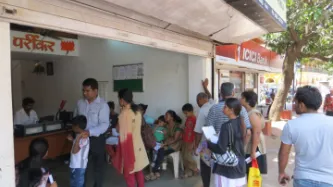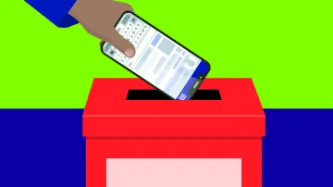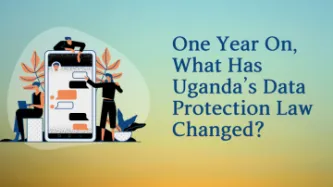Search
Content type: Examples
A report finds that most of the education technology endorsed by 49 governments in the rush to online learning during the covid-19 pandemic puts at risk or directly violates the privacy and rights of children for purposes unrelated to their education. Such platforms track children across the internet, access their contacts lists on social media and phones, and built profiles that can be used for manipulation.
https://www.hrw.org/report/2022/05/25/how-dare-they-peep-my-private-life/childrens-…
Content type: Examples
The pro-Ukrainian hacker group NLB Team leaked the personal data of more than 17 million children and parents who used Moscow Electronic School, an online learning platform that was built by the Moscow city government in 2016 and was its primary method of delivery online education during the covid-19 pandemic. The city government said the leaked data did not pertain to real users; however, a number of users identified their own data. Even before the leak, the platform was reportedly surveilling…
Content type: Examples
Ukraine and Russia are both weaponising facial recognition - but Russia is using it to hunt down anti-war protesters, holding and sometimes torturing anyone who refuses to be photographed, while Ukraine is using software donated by Clearview AI to help find Russian infiltrators at checkpoints, identify the dead and reunite families. Russia's widespread surveillance means that activists can be followed and arrested anywhere. In an approved, peaceful anti-government rally in Moscow in 2019,…
Content type: Examples
Footage captured by Bloomberg shows that police are arresting anti-war protesters in Russia and scrolling through their phones.
https://www.bloomberg.com/news/videos/2022-03-07/russian-police-search-protesters-phones-make-arrests-video
Writer: Kommersant
Publication: Bloomberg TV
Publication date: 2022-03-07
Content type: Examples
Based on a draft methodology from Russia's Emergency Situations Ministry, Kommersant business daily reports that Rostec's data subsidiary, Natsionalny Tsentr Informatizatsii, is developing software that will use machine learning to detect and prevent mass unrest. The software will analyse news reports, social media postings, public transport data, and video surveillance footage; if it fails to prevent mass unrest it is expected to direct the crowd's movements to stop it from escalating. The…
Content type: Examples
The Kommersant reports that Russia's Rostec State Corporation is developing a new AI-powered anti-riot surveillance system that uses biometrics-powered cameras and can search social media networks and other publicly accessible data and intends to deploy the new system by the end of 2022. The behaviou analysis software is being developed as part of the Safe City project under the aegis of the Ministry of Emergency Situations, which intends to spend 97 billion rubles ($1.3 billion) deploying Safe…
Content type: Examples
Russian authorities are using facial recognition to track opposition protesters to their homes and arrest them, though the cameras are often turned off or "malfunctioning" when state security agents are suspected of attacks on or murders of journalists and opposition activists. The data is gathered into a central database and is sold cheaply by corrupt officials on Russia's "probiv" black market in data. Facial recognition software, produced by local companies such as NtechLab, is…
Content type: Long Read
This piece was last updated in June 2021.
In many countries, access to social protection (such as welfare programmes or healthcare) is made conditional on producing a form of identification (“ID”). But obtaining a recognised and accurate ID is often a process riddled with discriminatory designs, bureaucracy and technical failures that prevent individuals from accessing the services they are entitled to. Even when people eventually get an ID, it might not accurately reflect who they are,…
Content type: News & Analysis
Uganda's Presidential election in January 2021 resulted in the incumbent President Museveni winning his sixth term in office, having held power for 35 years. The election took place amidst a global pandemic and the run up to election day was fraught. Violence left dozens dead and hundreds more arrested, including the opposition candidate Bobi Wine. Mass rallies and in person campaign meetings were banned due to Covid restrictions and political parties in Uganda were encouraged to conduct “…
Content type: News & Analysis
Unwanted Witness’ research into Safeboda highlighted the company’s failure to comply with some of the law's core data protection principles, with a number of implications for the exercise of data subject rights. The enforcement action against Safeboda by National Information Technology Authority, Uganda (NITA-U) requires the company to make fundamental changes to how they handle people's personal data in order to comply with the Data Protection and Privacy Act, 2019.
This first landmark…
Content type: Examples
On 2 March 2021, the Ministry of Health of Uganda unveiled its plan to immunize millions against COVID-19 starting on 10 March 2021.
The statement made by the Ministry of Health noted that "All persons eligible for vaccination will be required to provide a National Identification Card in the case of Ugandan citizens or a passport in the case of non-Ugandans".
Source: https://www.youtube.com/watch?v=asc5mQe0-3I
Publication: NTV News
Content type: Examples
Thousands of Muscovites ordered to download a hastily-developed app to enforce their quarantine report that they have been wrongly geolocated and fined and that the app has trapped them into compliance criteria that are impossible to meet. The app, which demands an exceptionally broad range of permission and stores the data on Moscow’s servers for a year, is compulsory for everyone with respiratory disease symptoms. Officials say it has helped keep the city’s death rate as low as 3.8%. Some…
Content type: Examples
Russian authorities are considering introducing an app that migrant workers will be required to download when they enter the country. Leaked details indicate that the app would contain detailed biometric data, health status, police records, and a “social trustworthiness” rating. It’s unclear whether the app would access other data such as geolocation and user content. Other aspects of surveillance are also expanding in Russia, such as using Moscow’s surveillance camera system to track those…
Content type: Case Study
The Ugandan government has a running contract with the Chinese tech giant, Huawei, to supply and install CCTV cameras along major highways within the capital, Kampala, and other cities.
While details of the contract remain concealed from the public, the Uganda Police Force (UPF) released a statement, simply confirming its existing business partnership for telecommunication and surveillance hardware, and software between the security force and Huawei. However, it is not clear whether the…
Content type: Examples
Technical flaws in Moscow's app, intended to track people with COVID-19 and symptoms of other respiratory diseases, led the authorities to wrongly fine hundreds, perhaps even thousands, of people, alleging they had breached self-quarantine. The app was originally launched at the end of March, but had to be taken down and relaunched in late April, when Moscow's mayor decreed that anyone displaying symptoms of a respiratory disease, as well as those testing positive for COVID-19, and anyone…
Content type: Examples
Moscow's first attempts to introduce digital methods by which residents could obtain digital passes to move around the city failed as the website collapsed numerous times and the app required them to get a pass for every single move rather than only to drive a car, as the government has stated. City authorities blamed DDoS attackers for the website problems and Muscovites' stupidity for the app issues and similar difficulties with SMS messages. There was also confusion over whether certain…
Content type: Examples
Our partners from Unwanted Witness in Uganda wrote a formal letter to the Ministry of Information Communications Technology and National Guidance demanding for strict observance of human rights for any intended use of surveillance technologies to fight COVID-19.
In a letter addressed to the Permanent Secretary Ministry of ICT, Hon. Vincent Bagiire and copied to Minister Judith Nabakooba, calls on government to respect its human rights obligation and restrain from exercising excessive…
Content type: Examples
Ten Ugandan police officers were charged with torture after allegedly caning 38 women and forcing them to swim in mud in Elegu, a town in the northern part of the country. Police have also arrested 23 people during a raid on a shelter for homeless lesbian, gay, bisexual and transgender youth, accused them of disobeying orders by remaining in the shelter, and charging them with a negligent act likely to spread infection or disease.
Source: https://www.bbc.co.uk/news/world-africa-52214740…
Content type: Examples
The city of Moscow is planning to use smartphone geolocation functions to track foreign tourists' movements through the city to prevent outbreaks of COVID-19 after Russia reopens its borders. Moscow accounts for two-thirds of all cases in the country. Moscow City Hall is considering a system that would provide daily updates on tourists' movements using their SIM card data and show when residents come into contact with them; it is already buying location data from Russia's three biggest telecom…
Content type: Examples
The Kazakhstani ministry of health requires the 8,000 or so Kazakhstani citizens currently under quarantine to use the SmartAstana tracking app, which enables officials to ensure that they remain in isolation. By contrast, for the city of Almaty the ministry of the interior relies on video surveillance technology called Sergek, produced by the local telecommunications firm Korkem Telecom to find people who break quarantine . So far, these two cases are the only examples of the government…
Content type: Examples
The Uganda Communications Commission announced on March 22 that it would crack down on people spreading fake videos and misinformation about the novel coronavirus through social media, noting that this behaviour is illegal under the Computer Misuse Act, the Data Protection and Privacy Act, and other penal laws. UCC went on to warn in a public notice that it would arrest and prosecute violators.
Sources:
http://www.china.org.cn/world/Off_the_Wire/2020-03/23/content_75847935.htm
https://twitter…
Content type: Examples
Owing to concerns about the possibility of spreading the coronavirus via banknotes and payment cards, Russia has begun testing its Unified Biometric System (EBS) for payments at a selection of grocery stores including Lenta supermarkets. The Russian bank VTB plans a mass roll-out for mid-2020. For the beginning of 2021, Promsvyazbank is planning trials of facial biometric payments, a system the bank is negotiating to introduce with several retail chains. Facial biometric payments are made…
Content type: Examples
Managed from a purpose-built coronavirus control centre, Moscow's network of 100,000 cameras equipped with facial recognition technology is being used to ensure that anyone placed under quarantine stays off the streets. Officials claim the centre can also be used to track international arrivals and monitor social media for misinformation.
Source: https://www.france24.com/en/20200324-100-000-cameras-moscow-uses-facial-recognition-to-enforce-quarantine
Writer: Sam Ball
Publication: France 24
Content type: Examples
Russian prime minister Mikhail Mishustin has ordered the country's Communications Ministry to develop a system, to be built on analysing specific individuals' geolocation data from telecommunications companies that can track people who have come into contact with those who have tested positive for the novel coronavirus. The data will also be passed to regional-level task forces fighting the virus's spread; officials are also tasked with finding a way to notify those who may have come into…
Content type: Examples
Russia has set up a coronavirus information centre to to monitor social media for misinformation about the coronavirus and spot empty supermarket shelves using a combination of surveillance cameras and AI. The centre also has a database of contacts and places of work for 95% of those under mandatory quarantine after returning from countries where the virus is active. Sherbank, Russia's biggest bank, has agreed to pay for a free app that will provide free telemedicine consultations.
Source:…
Content type: Examples
A document awaiting approval from the federal authorities outlines the measures Russia may need to adopt in the event of a widespread COVID-19 outbreak. In "emergency mode". The proposal's Plan A allows for cancelling all international sports, cultural, scientific, and social events in Moscow; surveillance of those who test positive along with tracing their contacts from video surveillance camera records and geolocation data as well as disinfection of their home and everywhere they and their…
Content type: Examples
Russian authorities are using surveillance cameras, facial recognition systems, and geolocation to enforce a two-week quarantine regime affecting 2,500 people. Chinese citizens are banned from entering Russia; Russians and citizens of other countries who arrive from China are required to go through two weeks of quarantine. Police raid hotels to find Chinese citizens who arrived before border controls began, and bus drivers have been ordered to call their dispatchers if they see Chinese citizens…
Content type: News & Analysis
This piece was originally published by Unwanted Witness here.
Today marks exactly one year since Uganda passed its data protection law, becoming the first East African country to recognize privacy as a fundamental human right, as enshrined in Art 27 of the 1995 Uganda Constitution as well as in regional and International laws.
The Data Protection and Privacy Act, 2019 aims to protect individuals and their personal data by regulating processing of personal information by state and non-state…
Content type: Examples
In February 2019, after investigative journalists used social media posts to investigate the country's hidden role in conflicts such as those in Ukraine and Syria, Russia began moving to ban its soldiers from posting any information that would expose their whereabouts or their role in the military. The ban would include photographs, video, geolocation data, and other information, and prohibit soldiers from sharing information about other soldiers and their relatives.
https://www.reuters.com/…




